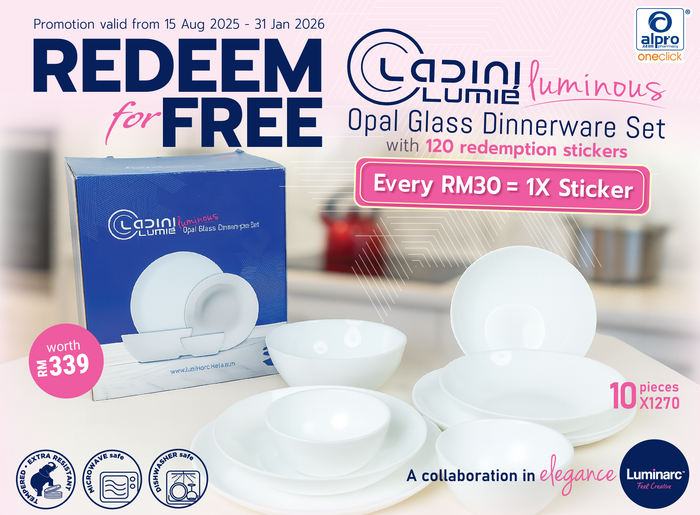
RM6 Shipping Off

100% Genuine Products

Million Dollar Insurance

Lifetime Loyalty Programme

Member's Birthday Special
Trending Collection

New Arrival
Group Buy
Gift Card
Xtra Point
Lowest Price
Guarantee
Pets Care
Save More with Vouchers
Min Spend:
Trending Collection







































Online Exclusive | 1 - 31 January 2026
View all-
4.67 / 5.0
Sold: 357Beseen Plus Improved Eye-Brain Booster 5gx30s
Regular price RM338.00Sale price RM338.00 Regular priceUnit price / per0% OFF RM338.00 -
4.83 / 5.0
Sold: 119Buy 2 Each @ RM50.00Powerlife Magnesium 555.56mg 60s
Regular price RM58.00Sale price RM58.00 Regular priceUnit price / per0% OFF RM58.00 -
4.33 / 5.0
Sold: 46Abbott Ensure Gold Vanilla YBG (Yeast Beta Glucan) 800g | Complete And Balanced Nutrition
Regular price RM98.90Sale price RM98.90 Regular priceUnit price / per1% OFF RM99.60 -
4.71 / 5.0
Sold: 0Buy 2 Each @ RM129.90GKB G-Pro Gold 60s | Boost Immunity
Regular price RM139.90Sale price RM139.90 Regular priceUnit price / per0% OFF RM139.90 -
5.0 / 5.0
Sold: 67Buy 3 Each @ RM80.00Powerlife Bonvital Essential Forte 60s | Strong & Healthy Bones
Regular price RM85.00Sale price RM85.00 Regular priceUnit price / per0% OFF RM85.00 -
/
Sold: 0Buy 2 Each @ RM7.90Uyiku Enhanced Automatic Toilet Cleaner 1s
Regular price RM9.90Sale price RM9.90 Regular priceUnit price / per0% OFF RM9.90 -
4.86 / 5.0
Sold: 188Buy 2 Each @ RM124.90GKB L. Plantarum GKM3 30s
Regular price RM134.90Sale price RM134.90 Regular priceUnit price / per0% OFF RM134.90 -
5.0 / 5.0
Sold: 0Abbott Ensure Gold Vanilla YBG (Yeast Beta Glucan) 1.48kg
Regular price RM182.90Sale price RM182.90 Regular priceUnit price / per6% OFF RM193.90 -
4.88 / 5.0
Sold: 192Buy 3 Each @ RM79.67GKB Probizymes 30s
Regular price RM85.00Sale price RM85.00 Regular priceUnit price / per0% OFF RM85.00 -
5.0 / 5.0
Sold: 0Moori Sensitive Wet Wipes 80s (×3 packs) | Wide Wipes with Aloe Vera Extract
Regular price RM24.00Sale price RM24.00 Regular priceUnit price / per16% OFF RM28.50 -
4.89 / 5.0
Sold: 103Buy 2 Each @ RM70.00Occufocus 20/20 18g 15s | For Adult Eye Health
Regular price RM76.00Sale price RM76.00 Regular priceUnit price / per30% OFF RM108.90 -
5.0 / 5.0
Sold: 0Buy 2 Each @ RM69.90Contour Plus Test Strip 2x25s | Get The Right Amount Of Blood
Regular price RM72.50Sale price RM72.50 Regular priceUnit price / per0% OFF RM72.50 -
4.62 / 5.0
Sold: 0Buy 3 Each @ RM66.63GKB Probio+ Probiotics and Prebiotics Formula 30s
Regular price RM73.50Sale price RM73.50 Regular priceUnit price / per0% OFF RM73.50 -
5.0 / 5.0
Sold: 232Abbott Ensure Gold Vanilla 800g x2 FOC 2 Sachets | Complete Nutrition
Regular price RM202.90Sale price RM202.90 Regular priceUnit price / per3% OFF RM208.80 -
5.0 / 5.0
Sold: 35Medi Premium Unisex Adult Diapers (XL) 10s | 5X Absorbency
Regular price RM36.50Sale price RM36.50 Regular priceUnit price / per17% OFF RM43.80 -
/
Sold: 58Befecto Slim Body Booster 30s | Support Weight Management
Regular price RM318.00Sale price RM318.00 Regular priceUnit price / per0% OFF RM318.00 -
4.92 / 5.0
Sold: 102Neurobion 6x10s | Relieve Numbess and Nerve Pain
Regular price RM45.90Sale price RM45.90 Regular priceUnit price / per4% OFF RM47.88 -
5.0 / 5.0
Sold: 87Moori Premium Wet Wipes 80s (×3 packs) | 3D Embossed & Easy Swipe Clean
Regular price RM30.00Sale price RM30.00 Regular priceUnit price / per20% OFF RM37.50 -
/
Sold: 26Morinaga Chil-Kid 3 Oishi 700g 1-3yrs | No Added Sucrose
Regular price RM66.00Sale price RM66.00 Regular priceUnit price / per11% OFF RM74.00 -
5.0 / 5.0
Sold: 874Buy 2 Each @ RM144.00Inside Out Morovive S 20g 15s
Regular price RM188.00Sale price RM188.00 Regular priceUnit price / per26% OFF RM255.00 -
5.0 / 5.0
Sold: 50Contour Plus Elite Starter Kit With 25s Strip
Regular price RM94.00Sale price RM94.00 Regular priceUnit price / per5% OFF RM99.00 -
4.95 / 5.0
Sold: 129Alcon Systane Ultra 5ml | Relief Dry Eyes
Regular price RM12.50Sale price RM12.50 Regular priceUnit price / per30% OFF RM17.80 -
4.94 / 5.0
Sold: 132Gaviscon Double Action (sachet) 10ml 5s | For Heartburn and Indigestion
Regular price RM18.53Sale price RM18.53 Regular priceUnit price / per-5% OFF RM17.58 -
4.62 / 5.0
Sold: 176Biogrow Oat BG22 480g | Lowering Cholesterol Level
Regular price RM49.88Sale price RM49.88 Regular priceUnit price / per0% OFF RM49.88 -
4.97 / 5.0
Sold: 0Medi Premium Unisex Adult Diapers (M) 10s | Fast Dry Absorption
Regular price RM29.60Sale price RM29.60 Regular priceUnit price / per14% OFF RM34.60 -
5.0 / 5.0
Sold: 75Buy 3 Each @ RM113.00THE ART VINE Coconut Vinegar (Bottle) 250g | Pure Natural
Regular price RM129.00Sale price RM129.00 Regular priceUnit price / per0% OFF RM129.00 -
/
Sold: 32Abbott Ensure Gold Wheat YBG (Yeast Beta Glucan) 800g | Improved Formula
Regular price RM102.90Sale price RM102.90 Regular priceUnit price / per5% OFF RM108.00 -
5.0 / 5.0
Sold: 25Medi Premium Unisex Adult Diapers (L) 10s
Regular price RM33.50Sale price RM33.50 Regular priceUnit price / per13% OFF RM38.33 -
/
Sold: 26Abbott Ensure Gold Almond (Plant Based) 800g | Complete And Balanced Nutrition
Regular price RM102.90Sale price RM102.90 Regular priceUnit price / per5% OFF RM108.00 -
4.45 / 5.0
Sold: 120Systane Hydration UD 30x0.7ml | Long-Lasting Relief
Regular price RM58.60Sale price RM58.60 Regular priceUnit price / per19% OFF RM72.60 -
4.8 / 5.0
Sold: 130Piascledine Capsule 300mg 2x15s | Joint Supplement
Regular price RM79.90Sale price RM79.90 Regular priceUnit price / per0% OFF RM79.90 -
5.0 / 5.0
Sold: 131Caltrate 600 Plus 2x100s | Bone Health Formation
Regular price RM99.77Sale price RM99.77 Regular priceUnit price / per-2% OFF RM97.78 -
/
Sold: 0Anlene Cholestopro 800g
Regular price RM43.50Sale price RM43.50 Regular priceUnit price / per0% OFF RM43.50 -
4.86 / 5.0
Sold: 99Alcon Tears Naturale Free 32x0.8ml | Soothing Protection Against Dryness.
Regular price RM42.10Sale price RM42.10 Regular priceUnit price / per29% OFF RM59.10 -
4.84 / 5.0
Sold: 3100Buy 2 Each @ RM75.65Actilite BBR 60s | For Weight Loss
Regular price RM85.00Sale price RM85.00 Regular priceUnit price / per30% OFF RM121.90 -
4.54 / 5.0
Sold: 100Polident Fresh Mint Denture Adhesive Cream 60g
Regular price RM22.40Sale price RM22.40 Regular priceUnit price / per-15% OFF RM19.53Sold Out -
/
Sold: 42Buy 2 Each @ RM2.75OATSIDE Wholegrain Oat Cereal Bar 18g (Chocolate/ Strawberry White Chocolate/ Peanut Butter)
Regular price RM4.50Sale price RM4.50 Regular priceUnit price / per8% OFF RM4.90Select OptionOATSIDE Wholegrain Oat Cereal Bar 18g (Chocolate/ Strawberry White Chocolate/ Peanut Butter)
Regular price RM4.50Sale price RM4.50 Regular priceUnit price / per8% OFF RM4.90OATSIDE Wholegrain Oat Cereal Bar 18g (Chocolate/ Strawberry White Chocolate/ Peanut Butter)
Regular price RM4.50Sale price RM4.50 Regular priceUnit price / per8% OFF RM4.90 -
/
Sold: 0Abbott Ensure Gold Wheat 800g X2 FOC 2 Sachets | Complete Nutrition
Regular price RM202.90Sale price RM202.90 Regular priceUnit price / per3% OFF RM208.80 -
5.0 / 5.0
Sold: 41Vitamode CoQ10 Ubiquinol 100mg Softgel 30s | Antioxidant Protection
Regular price RM95.00Sale price RM95.00 Regular priceUnit price / per25% OFF RM126.00 -
4.68 / 5.0
Sold: 150Abbott Isomil Plus Children's Soy Milk Formula 850g | For Age 1-10 Years Old
Regular price RM105.90Sale price RM105.90 Regular priceUnit price / per0% OFF RM105.90Sold Out -
5.0 / 5.0
Sold: 114Neutrovis 4 ply Premium Medical Face Mask with Extra Protection (Denim Blue) 50s | For Adult
Regular price RM19.90Sale price RM19.90 Regular priceUnit price / per0% OFF RM19.90 -
5.0 / 5.0
Sold: 183Centrum Silver Multivitamins 2x100s | Prevent Vitamin Deficiency
Regular price RM143.90Sale price RM143.90 Regular priceUnit price / per0% OFF RM143.90 -
/
Sold: 10Abbott Ensure Gold Wheat YBG (Yeast Beta Glucan) 1.48kg | Complete And Balanced Nutrition
Regular price RM182.90Sale price RM182.90 Regular priceUnit price / per6% OFF RM193.90 -
5.0 / 5.0
Sold: 141Tiger Balm White 4g
Regular price RM2.90Sale price RM2.90 Regular priceUnit price / per9% OFF RM3.20 -
4.9 / 5.0
Sold: 153Sterimar Baby Nasal Spray 100ml | Clears and Unblock Nasal Passage
Regular price RM55.60Sale price RM55.60 Regular priceUnit price / per0% OFF RM55.60 -
4.85 / 5.0
Sold: 128Sterimar Baby Nose Hygiene 50ml | Eliminate Impurities
Regular price RM24.78Sale price RM24.78 Regular priceUnit price / per28% OFF RM34.20 -
/
Sold: 25Scotts Vitamin C Zipper Pack 15s (Orange / Mango / Blackcurrant / Mixed Berries)
Regular price RM6.00Sale price RM6.00 Regular priceUnit price / per0% OFF RM6.00Select OptionScotts Vitamin C Zipper Pack 15s (Orange / Mango / Blackcurrant / Mixed Berries)
Regular price RM6.00Sale price RM6.00 Regular priceUnit price / per0% OFF RM6.00Scotts Vitamin C Zipper Pack 15s (Orange / Mango / Blackcurrant / Mixed Berries)
Regular price RM6.00Sale price RM6.00 Regular priceUnit price / per0% OFF RM6.00 -
5.0 / 5.0
Sold: 30Tiger Balm Lotion 80ml | Relief of Aches & Pains
Regular price RM17.10Sale price RM17.10 Regular priceUnit price / per10% OFF RM19.00 -
4.92 / 5.0
Sold: 120Listerine Cool Mint 2x750ml | Gives Lasting Fresh Breath
Regular price RM31.78Sale price RM31.78 Regular priceUnit price / per0% OFF RM31.78 -
4.64 / 5.0
Sold: 99Gaviscon Advance Powerful Relief Peppermint 150ml | Relief Heartburn and Indigestion
Regular price RM45.70Sale price RM45.70 Regular priceUnit price / per0% OFF RM45.70




















































































